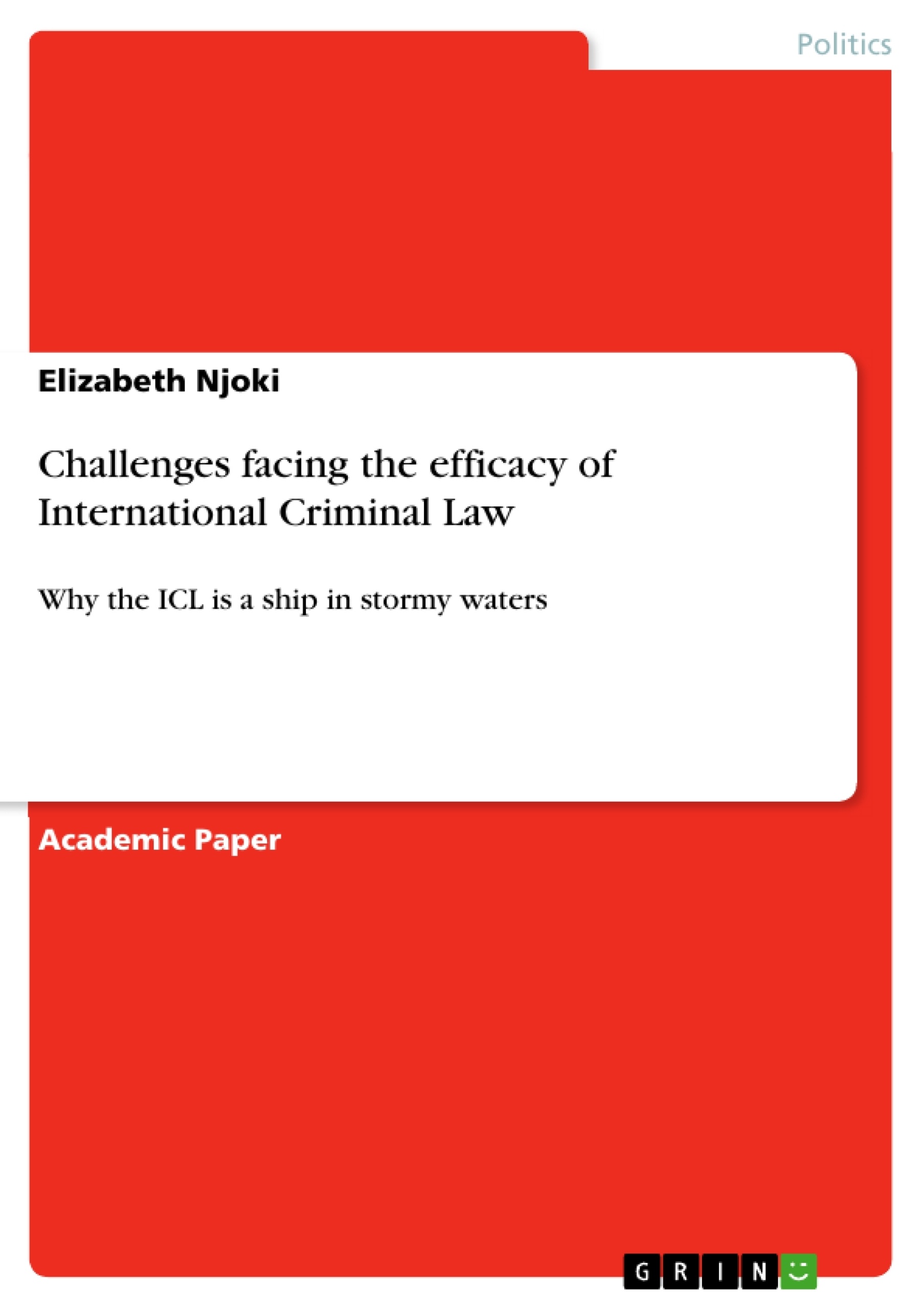This paper is a critical analysis of how the game of world politics has jeopardized the efficacy of International Criminal Law (ICL). International Criminal Law exists within a political space. It’s a ship in an ocean filled with storms of supremacy battles, power games, sovereignty conversations, self-interests and a lot more of political tides. This paper seeks to analyse how safely the ICL ship sails in the fierce waters. It seeks to see how the tides have affected the stability of the ship. Will the ICL vessel safely get to dock or is it faced with a risk of shipwreck?
The article concludes that there is indeed a danger of the ship being overthrown by the fierce waters and gives a recommendation to rescue the ship by adopting a definition of state sovereignty to the effect that all are above the law but bound by the law. This will make the objective of International Criminal Law realizable and deliver it from the fate of ineffectualness.
Inhaltsverzeichnis (Table of Contents)
- INTRODUCTION
- International Criminal Jurisdiction
- State sovereignty: The door to ICL
- Jurisdiction of the ICC
- THE LEGITIMACY OF THE ICL ENFORCEMENT SYSTEM
- The Hypocrisy of the UN Security Council.
Zielsetzung und Themenschwerpunkte (Objectives and Key Themes)
This paper examines the challenges facing the efficacy of International Criminal Law (ICL) and explores its effectiveness in the face of political pressures, sovereignty concerns, and the influence of powerful states. It investigates whether ICL can navigate the complex geopolitical landscape to achieve its goals of bringing perpetrators of international crimes to justice.
- The role of state sovereignty in ICL enforcement
- The jurisdiction of the International Criminal Court (ICC)
- The legitimacy and hypocrisy of the UN Security Council's role in ICL
- The challenges of enforcing ICL in a politically charged environment
- The potential for ICL to be undermined by powerful states
Zusammenfassung der Kapitel (Chapter Summaries)
- Introduction: This chapter introduces the concept of International Criminal Law (ICL) and its historical development. It discusses the principle of individual criminal liability for crimes against humanity and the evolution of ICL from its substantive origins to its modern procedural framework. The chapter also presents the central theme of the paper: exploring the challenges to ICL's efficacy in a politically charged environment.
- International Criminal Jurisdiction: This section delves into the concept of international criminal jurisdiction, explaining its role in enforcing ICL. It explores how the international community, through ad hoc tribunals, hybrid courts, and the ICC, exerts its jurisdiction to investigate and prosecute international crimes.
- State Sovereignty: The Door to ICL: This section examines the crucial relationship between state sovereignty and ICL. It argues that state sovereignty, while posing both opportunities and challenges, is a key factor in the effectiveness of ICL. The chapter discusses how treaties, as expressions of sovereign will, can either facilitate or hinder the application of ICL.
- Jurisdiction of the ICC: This section provides an overview of the ICC's jurisdiction, outlining its temporal, territorial, active personality, and complementary aspects. It highlights how the ICC's jurisdiction can be affected by state sovereignty and how states can use this to evade ICL enforcement.
- The Legitimacy of the ICL Enforcement System: This chapter explores the question of who has the moral right to enforce ICL. It criticizes the hypocrisy of the UN Security Council's permanent members, particularly the US, in their role as custodians of world peace and security. It also examines the role of Western countries in the conflicts that have led to many African states facing ICC investigations.
- The Hypocrisy of the UN Security Council: This section focuses on the UN Security Council's permanent members and their role in upholding the principles of ICL. It highlights the disparity between the stated objectives of the Rome Statute and the actions of the UNSC's permanent members, questioning their commitment to international criminal justice.
Schlüsselwörter (Keywords)
Key terms and concepts explored in this paper include international criminal law, state sovereignty, international criminal jurisdiction, the International Criminal Court (ICC), the UN Security Council, the Rome Statute, and the challenges to the enforcement of ICL in a politically charged environment.
Frequently Asked Questions
What are the main challenges facing International Criminal Law (ICL)?
The main challenges include political power games, state sovereignty issues, self-interest of powerful nations, and the influence of world politics on legal efficacy.
How does state sovereignty affect ICL enforcement?
State sovereignty acts as both a door and a barrier to ICL; while treaties are expressions of sovereign will, states often use sovereignty to evade the jurisdiction of the ICC.
What is the role of the International Criminal Court (ICC)?
The ICC exerts jurisdiction to investigate and prosecute international crimes, though its effectiveness is often hampered by the political landscape and state non-cooperation.
Why is the UN Security Council criticized in this paper?
The paper criticizes the permanent members of the UN Security Council for hypocrisy, as they often prioritize political interests over the principles of the Rome Statute.
What recommendation is given to improve the efficacy of ICL?
The article recommends adopting a definition of state sovereignty where all are above the law but bound by the law to ensure ICL objectives are realizable.
- Citation du texte
- Elizabeth Njoki (Auteur), 2018, Challenges facing the efficacy of International Criminal Law, Munich, GRIN Verlag, https://www.grin.com/document/453036



